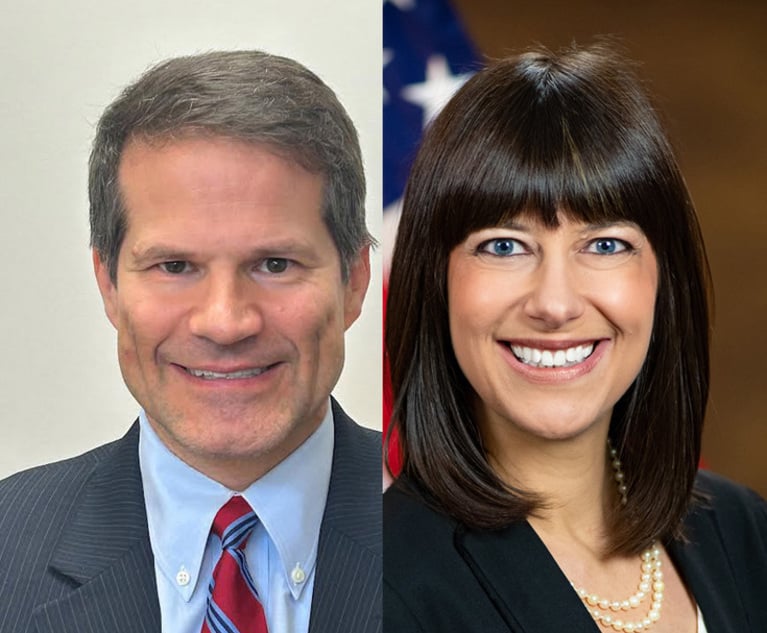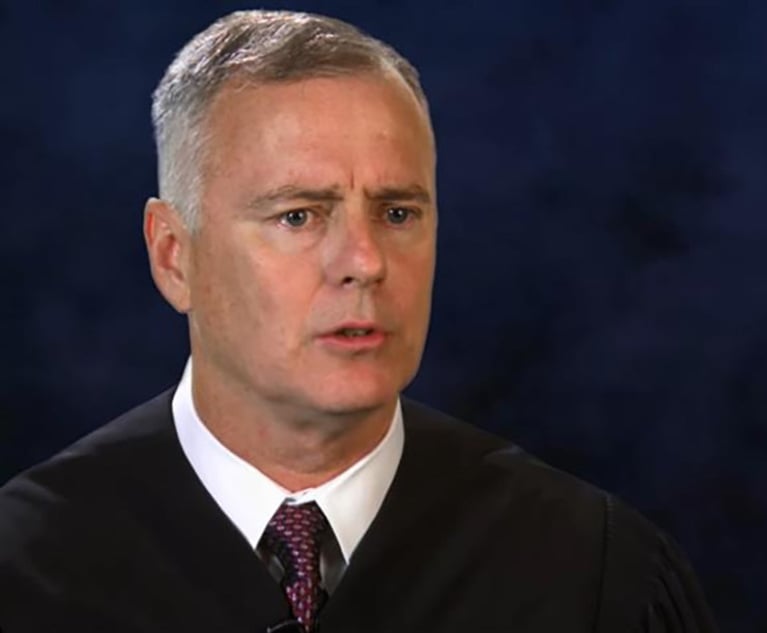 U.S. Supreme Court building
U.S. Supreme Court buildingUS Justice Dept. Warns of Age Bias 'Loophole' in SCOTUS Case
The justices were asked to resolve whether a small government agency should be exempt from age discrimination laws.
October 02, 2018 at 05:36 PM
4 minute read
The U.S. government raised concerns Monday at the U.S. Supreme Court that a ruling against a group of terminated firefighters claiming age bias would create a loophole benefiting employers in federal age discrimination enforcement cases.
The case at the high court, Mount Lemmon Fire District v. Guido, explores the scope of the Age Discrimination in Employment Act, the statute that governs protections for workers 40 years of age and older. The firefighters contend they were fired and replaced by younger workers.
The justices were asked to resolve whether a small government agency should be exempt from age discrimination laws, as small businesses with 15 or fewer employees are under Title VII of the federal civil rights laws. Title VII provides protections for race, national origin, religion and sex.
Jonathan Bond, an assistant to the solicitor general, argued as a friend-of-the-court on behalf of the U.S. Equal Employment Opportunity Commission. The EEOC was backing John Guido and his fellow worker Dennis Rankin, two captains who were fired from the Arizona-based Mount Lemmon Fire District. Bond told the justices the age-discrimination act “expressly covers” state and political subdivision employers regardless of their size.
Bond argued that a ruling for Mount Lemmon “would leave a sizable loophole that would allow any employer to evade the age act by outsourcing discrimination to small agents.”
Mount Lemmon, represented by Orrick, Herrington & Sutcliffe partner Joshua Rosenkranz, is appealing a ruling by the U.S. Court of Appeals for the Ninth Circuit. The appeals court said the fire district should not be exempt from federal age discrimination law, a decision that was contrary to other appeals court rulings. Rosenkranz argued the age discrimination law should not apply because Mount Lemmon had 13 employees in 2009 when it laid off Rankin, 54, and Guido, 46.
The age discrimination act, commonly known as the ADEA, defines the term “employer” as “a person engaged in an industry affecting commerce who has 20 or more employees for each working day in each of 20 or more calendar weeks in the current or preceding calendar year.” The law goes on to say that “the term also means … a state or political subdivision of a state.”
Rosenkranz said Congress intended for the age discrimination law to mirror Title VII, “so the question arises: Why did Congress supply that important protection only to private employees and not to public ones? Because that is the consequence of [the workers']' reading.” He argued the consequence for small agencies to be considered employers would be disastrous.
O'Melveny & Myers special counsel Jeffrey Fisher, who represented the firefighters, said the statute is unambiguous.
Justice Samuel Alito asked during one exchange: “Do you really think as a policy matter Congress would say that age discrimination is more pernicious and more widespread, so, therefore, we have to have a tougher remedy there than we do with respect to racial discrimination?”
Fisher acknowledged Congress could have made another choice, but ultimately, “It says the term 'employer' also means a state or political subdivision. That's all you need to decide this case. And it is absolutely clear. I'd urge the court to resist the temptation to go looking elsewhere in the statute for ambiguity as a reason why not to answer this case as to what the statute itself plainly says. And that's really, I think, the beginning and the end of it. And you can leave all that other stuff, if it ever comes back to the court, for another day.”
Read more:
This content has been archived. It is available through our partners, LexisNexis® and Bloomberg Law.
To view this content, please continue to their sites.
Not a Lexis Subscriber?
Subscribe Now
Not a Bloomberg Law Subscriber?
Subscribe Now
NOT FOR REPRINT
© 2024 ALM Global, LLC, All Rights Reserved. Request academic re-use from www.copyright.com. All other uses, submit a request to [email protected]. For more information visit Asset & Logo Licensing.
You Might Like
View All

Trump's Solicitor General Expected to 'Flip' Prelogar's Positions at Supreme Court

Auditor Finds 'Significant Deficiency' in FTC Accounting to Tune of $7M
4 minute read
Texas Court Invalidates SEC’s Dealer Rule, Siding with Crypto Advocates
3 minute readTrending Stories
- 1Section 1782 Practice Pointers From Recent Decisions
- 2Democratic State AGs Revel in Role as Last Line of Defense Against Trump Agenda
- 3Decision of the Day: Split Circuit Panel Bars Enforcement of Ivory Law's 'Display Restriction' on Antique Group Members
- 4Chiesa Shahinian Bolsters Corporate Practice With 5 From Newark Boutique
- 52 Years After Paul Plevin Merger, Quarles & Brady’s Revenue Up More than 13%
Who Got The Work
Michael G. Bongiorno, Andrew Scott Dulberg and Elizabeth E. Driscoll from Wilmer Cutler Pickering Hale and Dorr have stepped in to represent Symbotic Inc., an A.I.-enabled technology platform that focuses on increasing supply chain efficiency, and other defendants in a pending shareholder derivative lawsuit. The case, filed Oct. 2 in Massachusetts District Court by the Brown Law Firm on behalf of Stephen Austen, accuses certain officers and directors of misleading investors in regard to Symbotic's potential for margin growth by failing to disclose that the company was not equipped to timely deploy its systems or manage expenses through project delays. The case, assigned to U.S. District Judge Nathaniel M. Gorton, is 1:24-cv-12522, Austen v. Cohen et al.
Who Got The Work
Edmund Polubinski and Marie Killmond of Davis Polk & Wardwell have entered appearances for data platform software development company MongoDB and other defendants in a pending shareholder derivative lawsuit. The action, filed Oct. 7 in New York Southern District Court by the Brown Law Firm, accuses the company's directors and/or officers of falsely expressing confidence in the company’s restructuring of its sales incentive plan and downplaying the severity of decreases in its upfront commitments. The case is 1:24-cv-07594, Roy v. Ittycheria et al.
Who Got The Work
Amy O. Bruchs and Kurt F. Ellison of Michael Best & Friedrich have entered appearances for Epic Systems Corp. in a pending employment discrimination lawsuit. The suit was filed Sept. 7 in Wisconsin Western District Court by Levine Eisberner LLC and Siri & Glimstad on behalf of a project manager who claims that he was wrongfully terminated after applying for a religious exemption to the defendant's COVID-19 vaccine mandate. The case, assigned to U.S. Magistrate Judge Anita Marie Boor, is 3:24-cv-00630, Secker, Nathan v. Epic Systems Corporation.
Who Got The Work
David X. Sullivan, Thomas J. Finn and Gregory A. Hall from McCarter & English have entered appearances for Sunrun Installation Services in a pending civil rights lawsuit. The complaint was filed Sept. 4 in Connecticut District Court by attorney Robert M. Berke on behalf of former employee George Edward Steins, who was arrested and charged with employing an unregistered home improvement salesperson. The complaint alleges that had Sunrun informed the Connecticut Department of Consumer Protection that the plaintiff's employment had ended in 2017 and that he no longer held Sunrun's home improvement contractor license, he would not have been hit with charges, which were dismissed in May 2024. The case, assigned to U.S. District Judge Jeffrey A. Meyer, is 3:24-cv-01423, Steins v. Sunrun, Inc. et al.
Who Got The Work
Greenberg Traurig shareholder Joshua L. Raskin has entered an appearance for boohoo.com UK Ltd. in a pending patent infringement lawsuit. The suit, filed Sept. 3 in Texas Eastern District Court by Rozier Hardt McDonough on behalf of Alto Dynamics, asserts five patents related to an online shopping platform. The case, assigned to U.S. District Judge Rodney Gilstrap, is 2:24-cv-00719, Alto Dynamics, LLC v. boohoo.com UK Limited.
Featured Firms
Law Offices of Gary Martin Hays & Associates, P.C.
(470) 294-1674
Law Offices of Mark E. Salomone
(857) 444-6468
Smith & Hassler
(713) 739-1250








